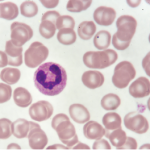
Despite the availability of drugs to successfully treat symptoms and prevent joint damage in many rheumatoid arthritis (RA) patients, researchers want to know more about how RA develops long before symptoms start. One such investigator at the University of Michigan Medical School in Ann Arbor is currently researching this subject, thanks to a pilot grant funded by the Rheumatology Research Foundation’s Disease Targeted Research Initiative. Mariana Kaplan, MD, is exploring the possible role of neutrophil extracellular traps (NETs) in the pathogenesis of RA.
“We are looking at some of the mechanisms that may lead to the development of rheumatoid arthritis,” says Dr. Kaplan, who has been working on this project with her colleagues for nearly two years. It is already known that activation of neutrophils causes the release of NETs, tiny webs of DNA that trap and kill disease-causing microorganisms, but NETs may also play a role in the inflammatory process. People with various autoimmune diseases, including psoriasis and lupus, show signs of enhanced NET formation. “We all form NETs in response to infection,” Dr. Kaplan explains, “but people predisposed to develop rheumatic disease tend to form NETs more often and in higher levels.”
Dr. Kaplan and her colleagues are investigating whether enhanced NET formation also occurs in RA, and if so, what triggers it and what inflammatory responses it causes. She explains the work is important because identifying and confirming the role of NETs in the development of RA could one day be the key to more advanced diagnosis and more effective treatments for the disease. “We are looking at how NETs damage joints, how NETs interact with each other and with the cells of the immune system, and how inhibiting NETs could ameliorate disease,” she says.
Dr. Kaplan stresses that support from the Foundation allows her and colleagues to delve into a new hypothesis that doesn’t have much preliminary data to support it. She says other funding sources, such as the National Institutes of Health, would not support this type of exploratory project. “This type of pilot funding is so important for the type of diseases we study, so we are delighted with the Foundation’s funding program.”
Rated four out of four stars by Charity Navigator, the Rheumatology Research Foundation is a 501(c)3 nonprofit organization with the mission to advance rheumatology research and training to improve the health of people with rheumatic disease. To learn more about the Rheumatology Research Foundation, please visit www.rheumatology.org/Foundation or contact us at [email protected].



